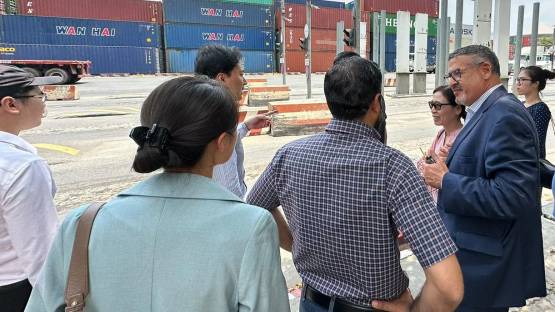 An International Atomic Energy Agency (IAEA) International Security Advisory Mission (INSServ) following a 10-day visit to Vietnam said the country has made progress towards establishing an effective national nuclear security regime for nuclear or other radioactive material out of regulatory control. The team encouraged the authorities to further integrate existing systems and measures into a national nuclear security policy.
An International Atomic Energy Agency (IAEA) International Security Advisory Mission (INSServ) following a 10-day visit to Vietnam said the country has made progress towards establishing an effective national nuclear security regime for nuclear or other radioactive material out of regulatory control. The team encouraged the authorities to further integrate existing systems and measures into a national nuclear security policy.
The mission, which was the first of its kind to Vietnam, was conducted at the request of the Government and hosted by the Vietnam Agency for Radiation & Nuclear Safety (Varans). INSServ missions aim to help States to better prevent, detect and respond to criminal and intentional unauthorised acts involving nuclear or other radioactive material lost, missing, stolen, improperly disposed of, or not adequately stored or handled.
The team assessed the roles and responsibilities of authorities that deal with nuclear security and their stakeholders. They reviewed how Varans coordinates with other authorities such as the General Department of Vietnam Customs, the Ministry of Public Security, the Ministry of National Defence and the National Committee for Emergency Response, Search & Rescue.
The team also conducted site visits in Hanoi and Ho Chi Minh City. It observed Vietnamese Front Line Officers operating Radiation Port Monitors (RPMs) at Noi Bai International Airport and at Cat Lai Seaport. The Ministry of Public Security briefed the team about nuclear security systems and measures for major public events.
“A strong nuclear security culture and a smooth cooperation among involved stakeholders are essential for the detection and response to criminal acts involving nuclear or other radioactive material,” said Elena Buglova, Director of the IAEA Division of Nuclear Security. “By requesting a full scope INSServ mission, Vietnam has shown its commitment to further focus on areas such as the legislative and regulatory framework for nuclear security.”
The INSServ team made several recommendations. “We focused on how Vietnam’s authorities can further enhance the coordination among involved organisations, as well as the effectiveness of nuclear security systems and measures available at the country’s seaports and international airports by placing them under a national detection architecture,” said Khammar Mrabit, a former Director General of the Moroccan Agency for Nuclear & Radiological Safety & Security , who led the mission. The team included four other nuclear security experts from Brazil, Malaysia, Pakistan, the USA and one from the IAEA.
The team also identified a number of good practices, including:
- Co-operation with other countries to share information for better understanding of threats and to activate response mechanisms in a timely manner;
- An on-going research programme on radiation detection instruments for ensuring a sustainable approach at the national level; and
- The capacity built in the area of nuclear security systems and measures for major public events.
Image: The INSServ team visited the Cat Lai Seaport in Ho Chi Minh City as part of a 10-day IAEA mission to Vietnam (courtesy of F. Liu/IAEA)






